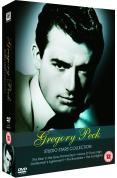![All About Eve [1950]](/pictures/1012880.jpg) All About Eve | DVD | (18/02/2002)
from £N/A
| Saving you £N/A (N/A%)
| RRP
All About Eve | DVD | (18/02/2002)
from £N/A
| Saving you £N/A (N/A%)
| RRP Alfred Hitchcock famously observed that movies should be more than just picture postcards of people talking. Sometimes, though, dialogue is all that's needed. Joseph L. Mankiewicz's immaculately scripted All About Eve is a case in point. There are no special effects (unless one considers Marilyn Monroe's wiggle or a scene in which a car breaks down). What the movie offers instead is some of the most coruscating one-liners ever committed to celluloid. The top-name cast certainly know how to put Mankiewicz's words across. Anne Baxter is all doe-eyed charm as Eve, the ruthless aspiring actress who passes herself off as a little girl lost. George Sanders (eminent character actor and the voice of Shere Khan the tiger in The Jungle Book) shows his customary mellowness of sneer as Addison De Witt, theatre critic and professional cynic ("a venomous foot louse" as he's characterised) who helps push Eve up the greasy pole toward success, if not happiness. Best of all is Bette Davis, a soured but still resplendent stage diva, who takes Eve under her wing. ("I'll admit I've seen better days but I'm still not to be had for the price of a cocktail--like a salted peanut", she tells her lover.) The plotting and double-dealing on the screen, described in Sam Staggs' All About All About Eve: The Complete Behind-the-Scenes Story of the Bitchiest Film Ever Made, were matched by what went on behind the scenes. Davis heartily loathed fellow actress Celeste Holm who--ironically enough--plays her best friend. She fell in love with another co-star, the handsome, good-looking Gary Merrill, whom she later married. Backstage dramas are often self-indulgent and stagy affairs, but this one dazzles. --Geoffrey Macnab
![Twelve O'Clock High [1949]](/pictures/1001601.jpg) Twelve O'Clock High | DVD | (03/05/2004)
from £7.24
| Saving you £5.75 (79.42%)
| RRP
Twelve O'Clock High | DVD | (03/05/2004)
from £7.24
| Saving you £5.75 (79.42%)
| RRP The war-time memories of surviving World War II bomber squadrons were still crystal clear when this acclaimed drama was released in 1949--one of the first post-war films out of Hollywood to treat the war on emotionally complex terms. Framed by a post-war prologue and epilogue and told as a flashback appreciation of war-time valour and teamwork, the film stars Gregory Peck in one of his finest performances as a callous general who assumes command of a bomber squadron based in England. At first, the new commander has little rapport with the 918th Bomber Group, whose loyalties still belong with their previous commander. As they continue to fly dangerous mission over Germany, however, the group and their new leader develop mutual respect and admiration, until the once-alienated commander feels that his men are part of a family--men whose bravery transcends the rigours of rigid discipline and by-the-book leadership. The film's now-classic climax, in which the general waits patiently for his squad to return to base--painfully aware that they may not return at all--is one of the most subtle yet emotionally intense scenes of any World War II drama. With Peck in the lead and Dean Jagger doing Oscar-winning work in a crucial supporting role, this was one of veteran director Henry King's proudest achievements, and it still packs a strong dramatic punch. --Jeff Shannon, Amazon.com
![Decision Before Dawn [DVD]](/pictures/1105267.jpg) Decision Before Dawn | DVD | (31/01/2011)
from £N/A
| Saving you £N/A (N/A%)
| RRP
Decision Before Dawn | DVD | (31/01/2011)
from £N/A
| Saving you £N/A (N/A%)
| RRP Tense spy drama about a German traitor who offers his services to the Allies towards the end of WWII. Claiming he wants to help save his country German prisoner Karl Maurer (Oskar Werner) offers himself as a spy to the American forces. But shortly after he is sent behind enemy lines his overseer Lt. Dick Rennick (Richard Basehart) begins to have serious doubts about whether he can trust the new recruit. With Rennick becoming ever more suspicious about Maurer's motives the pair soon find themselves in the thick of battle but uncertainty remains as to who the common enemy is.
 Gregory Peck Collection - The Man In The Gray Flannel Suit/Twelve O'Clock High/Gentleman's Agreement/The Bravados/The Gunfighter | DVD | (17/09/2007)
from £N/A
| Saving you £N/A (N/A%)
| RRP
Gregory Peck Collection - The Man In The Gray Flannel Suit/Twelve O'Clock High/Gentleman's Agreement/The Bravados/The Gunfighter | DVD | (17/09/2007)
from £N/A
| Saving you £N/A (N/A%)
| RRP Titles Comprises: The Man In The Grey Flannel Suit (Dir. Nunnally Johnson) (1956): An ex-soldier faces ethical questions as he tries to earn enough to support his wife and children well. Twelve O'Clock High (Dir. Henry King) (1949): Convinced an Air Force Commander is at breaking point Brigadier General Savage (Gregory Peck) takes over his struggling bomber group. At first resentful and rebellious the flyers gradually change as Savage guides them to amazing feats. But the stress of command soon takes its toll and the weary general reaches his own breaking point. Gentleman's Agreement (Dir. Elia Kazan) (1947): One of the first films to directly tackle racial prejudice this acclaimed adaptation of Laura Z. Hobson's bestseller stars Gregory Peck as a journalist assigned to write a series of articles on anti-Semitism. Searching for an angle he finally decides to pose as a Jew - and soon discovers what it is like to be a victim of religious intolerance. The Bravados (Dir. Henry King) (1958): When four men who Jim Douglas (Gregory Peck) believes raped and killed his wife escape from their death sentences Jim sets out to track the men down and enact his own vengeance. An honest man Jim sees his actions as just and brave but as he crisscrosses Mexico to exact an eye for an eye he comes to realize that he has lost something of himself in his self-absorbed quest for revenge. The Gunfighter (Dir. Henry King) ()1950: Gregory Peck stars as Jimmy Ringo one of the fastest draws in the West but desperately sick of killing and lonely traveling. This gripping tale surrounds Ringo's efforts to build a new life. Throughout encounters with old friends new enemies his estranged wife and his first meeting with his only child Peck offers an intricate portrait of a man harboring deep regrets about his own past.
![The War Collection [1949]](/pictures/1000158.jpg) The War Collection | DVD | (08/08/2005)
from £22.50
| Saving you £37.49 (166.62%)
| RRP
The War Collection | DVD | (08/08/2005)
from £22.50
| Saving you £37.49 (166.62%)
| RRP A collection of 10 all-time classic war films in one box set! Twelve O'Clock High (Dir. Henry King 1940): This gritty WWII action drama starring Gregory Peck Dean Jagger and Hugh Marlowe is seen as one of the most realistic portrayals of heroics at war. Behind Enemy Lines (Dir. John Moore 2001): Gene Hackman and Owen Wilson excel in this high flying action thriller with explosive excitement at every turn. Courage Under Fire (Dir. Edward Zwick 1996): Featuri
 Ultimate Studio Classics Collection (Pack of 70 DVDS - Exclusive to Amazon.co.uk) | DVD | (28/11/2005)
from £N/A
| Saving you £N/A (N/A%)
| RRP
Ultimate Studio Classics Collection (Pack of 70 DVDS - Exclusive to Amazon.co.uk) | DVD | (28/11/2005)
from £N/A
| Saving you £N/A (N/A%)
| RRP ![All About Eve [1950]](/pictures/1037628.jpg) All About Eve | DVD | (27/02/2006)
from £N/A
| Saving you £N/A (N/A%)
| RRP
All About Eve | DVD | (27/02/2006)
from £N/A
| Saving you £N/A (N/A%)
| RRP It's all about women... and their men! From the moment she glimpses her idol at the stage door Eve Horrington (Anne Baxter) moves relentlessly towards her goal: taking the reins of power from the great actress Margo Channing (Bette Davies). The cunning Eve manoeuvres her way into Margo's Broadway role becomes a sensation and even causes turmoil in the lives of Margo's director boyfriend (Gary Merrill) her playwright (Hugh Marlowe) and his wife (Celeste Holm). Only the cynic

Please wait. Loading...
This site uses cookies.
More details in our privacy policy